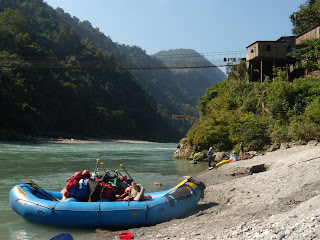
I realized that most of my French language experiences have been during the winter- classes at PSU in February, Montréal in thigh deep snow, and now Montpellier in 6° weather (Celsius, which I think makes it in the upper thirties in Fahrenheit?). Winter is a time of suspended action- when bears retire to their caves and the life nectars of flowers retreat into bulbs in the ground. People use clothing and their positions to create barriers against the cold, against the world outside their bodies. Buildings and homes, too, are closed, creating miniature walled cities of warmth.
Like Montpellier in the cold, I feel shut off from the
 world, muted. I am winter like the still, empty, cold sand of the beach. Il y a une distance entre moi et le monde. People here don't really speak English, which is good for learning French, but it means I can't communicate with people so well. We speak only French in the house where I stay, and only French in the classes. I haven't met many people, so I spend my days wandering the stone streets of Montpellier and drinking espresso and eating de les croissant chocolats by myself, surrounded by dancing and prancing foreign words. I am getting better at speaking French, though! Even my thoughts are beginning parler à moi en français. I am thinking again of living in Montréal, Québec. France is a little too fancy for me; everyone dresses so sharply. The pastries and the lingerie show off delicately, proudly, deliciously, from the shined glass windows of boutiques and boulangeries.
world, muted. I am winter like the still, empty, cold sand of the beach. Il y a une distance entre moi et le monde. People here don't really speak English, which is good for learning French, but it means I can't communicate with people so well. We speak only French in the house where I stay, and only French in the classes. I haven't met many people, so I spend my days wandering the stone streets of Montpellier and drinking espresso and eating de les croissant chocolats by myself, surrounded by dancing and prancing foreign words. I am getting better at speaking French, though! Even my thoughts are beginning parler à moi en français. I am thinking again of living in Montréal, Québec. France is a little too fancy for me; everyone dresses so sharply. The pastries and the lingerie show off delicately, proudly, deliciously, from the shined glass windows of boutiques and boulangeries.Montpellier is a very old city, with beautiful stone carvings and wrought iron decorating the buildings. There are fountains throughout la centre ville with green moss growing and glowing on them. J'ai visité la plage (the beach), aussi. The sky felt so expansive, and the clouds were beautifully varied textures of pastel colors, une belle peinture. Two people galloped on horses along the beach, trés romantique, non? A few days ago, a rainbow was a visage of hope pendant the clouds held back their tears.
Cette une coincidence que mon anniversaire etait le meme jour que le fete de Saint Catherine. Alors, I got to drink champagne and eat quiche and petites French desserts during a party held for my host's family! My classmates also sang Happy Birthday to me in French. And I received some very nice e-mails (including dancing frogs).
Learning a language is trés trés dificil, as is life sometimes. I am realizing that I just have to have faith that there will be improvement, that the mistakes and efforts are worthwhile and are actually beneficial experiences.

















 ge scarves, a cloth wrapped around his waist, with his long dreadlocks wrapped around his head and a freshly painted bindi in the place of the third eye. We are walking in opposite direction along the ghats on the Mother Ganges. He asks me in very good English how I am doing, warmth gleaming from his eyes. He, too, wants my money. I am in a good mood, and this man is kind and friendly (and close to God, no?). I give him an orange (which seems fitting except the oranges here are green on the outside), and he gives me a blessing.
ge scarves, a cloth wrapped around his waist, with his long dreadlocks wrapped around his head and a freshly painted bindi in the place of the third eye. We are walking in opposite direction along the ghats on the Mother Ganges. He asks me in very good English how I am doing, warmth gleaming from his eyes. He, too, wants my money. I am in a good mood, and this man is kind and friendly (and close to God, no?). I give him an orange (which seems fitting except the oranges here are green on the outside), and he gives me a blessing.
 Varanasi is one of the holiest cities in India. The River Ganges runs beside the city, its banks lined with ghats (cement stairs accessing the water). The water, which is maybe the dirtiest water in the world (with bodies, chemicals, sewage, debris, fa
Varanasi is one of the holiest cities in India. The River Ganges runs beside the city, its banks lined with ghats (cement stairs accessing the water). The water, which is maybe the dirtiest water in the world (with bodies, chemicals, sewage, debris, fa
